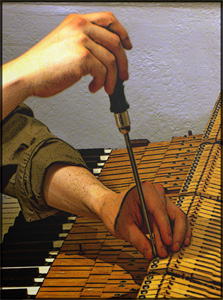
Piano Tuning FAQ
It is highly recommended to have your piano tuned at least once a year, preferably twice, to avoid future tuning and voicing issues, pitch-correction procedures, and to check for any potential structural issues that can be easily fixed or remedied when found early.
New and recently-restrung pianos often require 3-4 tunings during the first year or two to properly maintain correct tension and regulation across the instrument during the settling-in period.
The answer is both humidity and time. During the summer, high levels of relative humidity increase the moisture content in the soundboard causing it to increase its crowned shape. The bridge, which is mounted on the crown of the soundboard, will then put more pressure upward on the strings causing the piano to go sharp in pitch. The reverse is true in the winter when there is less pressure on the strings from the bridge and the piano goes flat. Over many years and season changes, the piano will gradually lose string tension causing the instrument to go flat in pitch overall and this is especially prevalent with new or recently restrung instruments.
Each piano responds differently to humidity changes and every environment is different, so this question is usually best answered on a case-by-case basis. With major seasonal humidity swings such as in schools, 2-3 tunings each year is usually required to keep a piano close to in tune. In more stable environments, someones one tuning each year will suffice. If your piano has been recently moved, it is recommended that you wait approximately 2-3 weeks for the piano to adjust to its new environment.
The best thing to do for your piano in New England is to keep the heat as low as possible in the piano room during the winter, thus keeping the relative humidity as high as possible. A whole-house humidifier or dehumidifier(s) are two other helpful options.
Dampp-Chaser Piano Life-Saver Systems are highly recommended especially for upright pianos that demonstrate major intonation issues from summer to winter. These systems are designed to keep the relative humidity and therefore the moisture content of the wood (EMC) and tuning of the piano as consistent as possible, and also helps protect the soundboard, bridges, and tuning pinblock from developing cracks prematurely. In grand pianos, these systems mainly help protect the soundboard. Adding a room humidifier in the winter, not using a fireplace, keeping the piano away from any direct heating/AC vents and outside walls, and using air conditioning or a dehumidifier during the summer are also recommended.
Regulation is the process of returning all the aspects of the action, which are the functioning mechanical parts of the piano, to factory specifications including key and hammer height (strike distance), key dip, after-touch, let-off distance, and damper timing among many other aspects. Proper regulation provides the player with correct touch and repetition at all dynamic levels (piano to forte) for performance and educational purposes and it is a prerequisite for voicing.
Voicing is the art of bringing out the full potential of the tone of an instrument, evening the tone of the instrument from note to note, or shading the entire piano tone darker or brighter depending on personal preference. As pianos get played, the hammers develop hardened grooves in the felt which cause the tone of the instrument to get harsh and lose resonance and “bloom”. Voicing is most often called upon in this situation and a combination of hammer felt reshaping and fine needling of each hammer is needed to restore the intended tone.
Yes, I would be happy to guide you in the right direction and recommend an instrument that would be suitable for your needs and within your budget. I always recommend having a technician check out any used instrument prior to purchase.
Email donnellypianoservice@gmail.com or call (617) 646-9711 to schedule an appointment.
